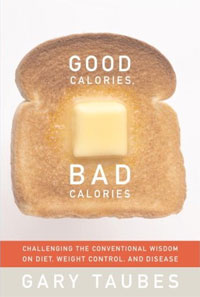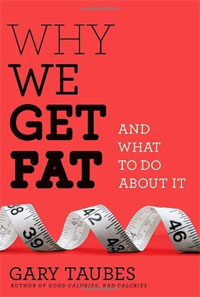How to Eat Healthy
Anyone who eats food and has concerns about their weight or their heart needs to read one of these books by Gary Taubes.
Good Calories, Bad Calories is the book to read if you want the most data. The book gets much deeper into the research, and has a massive number of supporting endnotes. Why We Get Fat is kind of the executive summary, although the fact that it's newer means it does have a couple of studies included that weren't available for the first book. It also includes an appendix that has a recommended diet that comes from Duke University, which I don't think the first book had. It's a much shorter and easier read, but just gives the broad brush of the scientific and clinical research.
We know now that carbohydrates make us fat, and it’s been demonstrated in numerous clinical trials that low-carbohydrate, high-fat diets improve each and every one of the metabolic and hormonal abnormalities of metabolic syndrome—the low HDL, the high triglycerides, the small, dense LDL, the high blood pressure, and the insulin resistance and chronically elevated levels of insulin. This suggests the obvious: that the same carbohydrates that make us fat are the ones that cause metabolic syndrome. And it tells us that the best and perhaps only way to treat the condition, as with obesity and overweight, is to avoid carbohydrate-rich foods, particularly the ones we digest easily, and sugars. Why We Get Fat, Page 198
People are often willing to accept the fact that low carbohydrate diets might be able to actually help you lose weight. The sticking point usually comes in when it's assumed that you may lose weight, but that your heart health will suffer because you're eating more fat in your diet. What these books show with their meticulous analysis of all available research, however, is that this is not the case. Not only do low carbohydrate, high fat diets help us lose weight, they also actually improve our heart health and help prevent other diseases like diabetes, and even cancer and dementia.
Recent studies that compare various diets have continued to support this data. The general results of the low carbohydrate, high fat diets compared to the more commonly recommended low fat, low calorie diets are as follows:
Why We Get Fat, Page 190
- They lost at least as much weight, if not considerably more.
- Their HDL cholesterol went up.
- Their triglycerides went way down.
- Their blood pressure went down.
- Their total cholesterol remained about the same.
- Their LDL cholesterol went up slightly.
- Their risk of having a heart attack decreased significantly.
To get a little more specific, here is a chart of results from the "A to Z Weight Loss Study" published in The Journal of the American Medical Association in 2007. This study compared The Atkins diet (the poster child for low carb diets), a traditional semi-starvation diet known as the LEARN diet in which carbs make up more than half the calories, the Ornish diet which is an extremely low fat diet, and the Zone diet which has equal parts of fat and protein and a little more carbohydrates than either.
| Group | Weight | LDL | Trig | HDL | BP |
|---|---|---|---|---|---|
| Atkins | -9.9 lb | +0.8 | -29.3 | +4.9 | -4.4 |
| Traditional | -5.5 lb | +0.6 | -14.6 | -2.8 | -2.2 |
| Ornish | -5.3 lb | -3.8 | -14.9 | 0 | -0.7 |
| Zone | -3.3 lb | 0 | -4.2 | +2.2 | -2.1 |
Why We Get Fat, Page 191
Hopefully this gives you enough information to want to want to find out more and read one of the books. If you want to have a healthy weight and a healthy heart, you need to cut out some carbs. How much and which carbs depends on your own specific genetic freakiness. You don't all have to be as extreme as I.
August 27, 2011

